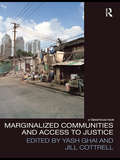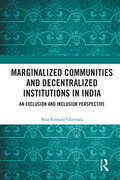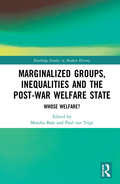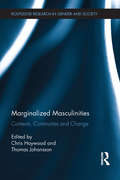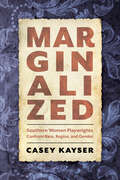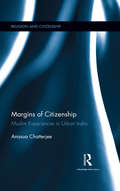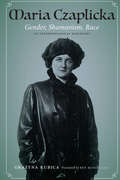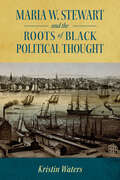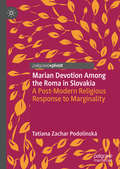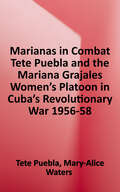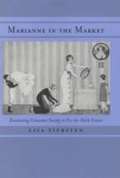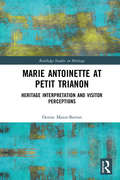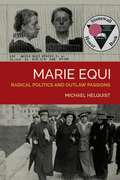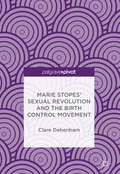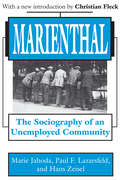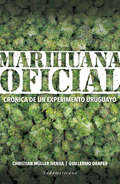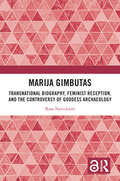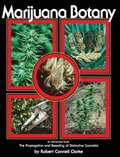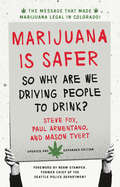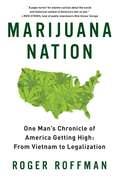- Table View
- List View
Marginalized Communities and Access to Justice (Law, Development and Globalization)
by Yash Ghai Cbe Jill CottrellMarginalized Communities and Access to Justice is a comparative study, by leading researchers in the field of law and justice, of the imperatives and constraints of access to justice among a number of marginalized communities. A central feature of the rule of law is the equality of all before the law. As part of this equality, all persons have the right to the protection of their rights by the state, particularly the judiciary. Therefore equal access to the courts and other organs of the state concerned with the enforcement of the law is central. These studies – undertaken by internationally renowned scholars and practitioners – examine the role of courts and similar bodies in administering the laws that pertain to the entitlements of marginalized communities, and address individuals' and organisations' access to institutions of justice: primarily, but not exclusively, courts. They raise broad questions about the commitment of the state to law and human rights as the principal framework for policy and executive authority, as well as the impetus to law reform through litigation. Offering insights into the difficulties of enforcing, and indeed of the will to enforce, the law, this book thus engages fundamental questions about value of engagement with the formal legal system for marginalized communities.
Marginalized Communities and Decentralized Institutions in India: An Exclusion and Inclusion Perspective
by Bala Ramulu ChinnalaThis book examines the causes and consequences of marginalization of social groups and the state of democratic decentralization in India in the unfolding context of globalization and changing perspectives of development models and institutions. The first of its kind, it correlates macro-and micro-level issues to understand social exclusion and inclusion and the level of participation of democratic institutions at the grassroots level since economic liberalization (1991) and the 73rd Constitution Amendment Act of 1992, marking three decades since granting constitutional status to the Panchayati Raj Institutions. The study looks at the linkages between certain key themes: the neoliberal model of development, growth, and distributive justice; the role and mandate of grassroots-level public institutions enshrined in the Constitution, inclusive growth, and the Indian State; the role of political executives from marginalized communities; factors involved in people’s active participation in the development process; and challenges in current political structures, inclusion of marginalized communities in governance and development, and real empowerment of local bodies and institutions. The book argues that legislative enactments, constitutional status, reservation of seats to marginalized communities, and so on can only empower local bodies and their leadership symbolically. The success of these provisions depends on the overall development model of the country; the support of national and state governments; the socio-economic and political environment of the institutions; and effective service and accountability. Topical and rich in empirical data, including case studies, this book will be an essential read for scholars and researchers of political science, development studies, governance, public administration, sociology, public policy, and also for government agencies, administrators and bureaucrats, policymakers, international organizations, think tanks, and NGOs working in the area.
Marginalized Groups, Inequalities and the Post-War Welfare State: Whose Welfare? (Routledge Studies in Modern History)
by Monika Baár Paul Van TrigtExamining the ways in which societies treat their most vulnerable members has long been regarded as revealing of the bedrock beliefs and values that guide the social order. However, academic research about the post-war welfare state is often focused on mainstream arrangements or on one social group. With its focus on different marginalized groups: migrants and people with disabilities, this volume offers novel perspectives on the national and international dimensions of the post-war welfare state in Western Europe and North America.
Marginalized Masculinities: Contexts, Continuities and Change (Routledge Research in Gender and Society)
by Chris Haywood and Thomas JohanssonAcross Europe we are witnessing a series of events that are drawing upon representations of men and masculinity that are rupturing the social fabric of everyday life. For example, media reports of social unrest, misogynous hate crime, religious extremism, drug trafficking and political Far Right mobilization often have been at the centre of the discussion the figure of the apathetic, disenchanted, socially excluded young man. Marginalized Masculinities explores how men in precarious positions in different countries and social contexts understand and experience their masculinities, focusing on men who are viewed as being marginal in a range of fields in society including the family, work, the media and school. By focusing on atypical or marginal masculinities in each subfield, Haywood and Johansson provide an informed understanding of what it means to experience marginalization. Indeed, within this enlightening volume the chapters engage with the issue of whether it is necessary to name ‘a’ dominant masculinity in order to make sense of and understand the nature of marginalized masculinity. This insightful title will be of interest to researchers, undergraduates and postgraduates interested in fields such as Gender Studies, International Studies, Comparative Studies and Men Studies.
Marginalized: Southern Women Playwrights Confront Race, Region, and Gender
by Casey KayserWinner of the 2021 Eudora Welty PrizeIn contrast to other literary genres, drama has received little attention in southern studies, and women playwrights in general receive less recognition than their male counterparts. In Marginalized: Southern Women Playwrights Confront Race, Region, and Gender, author Casey Kayser addresses these gaps by examining the work of southern women playwrights, making the argument that representations of the American South on stage are complicated by difficulties of identity, genre, and region. Through analysis of the dramatic texts, the rhetoric of reviews of productions, as well as what the playwrights themselves have said about their plays and productions, Kayser delineates these challenges and argues that playwrights draw on various conscious strategies in response. These strategies, evident in the work of such playwrights as Pearl Cleage, Sandra Deer, Lillian Hellman, Beth Henley, Marsha Norman, and Shay Youngblood, provide them with the opportunity to lead audiences to reconsider monolithic understandings of northern and southern regions and, ultimately, create new visions of the South.
Margins of Citizenship: Muslim Experiences in Urban India (Religion and Citizenship)
by Anasua ChatterjeePart of the ‘Religion and Citizenship’ series, this book is an ethnographic study of marginality of Muslims in urban India. It explores the realities and consequences of socio-spatial segregation faced by Muslim communities and the various ways in which they negotiate it in the course of their everyday lives. By narrating lived experiences of ordinary Muslims, the author attempts to construct their identities as citizens and subjects. What emerges is a highly variegated picture of a group (otherwise viewed as monolithic) that resides in very close quarters, more as a result of compulsion than choice, despite wide differences across language, ethnicity, sect and social class. The book also looks into the potential outcomes that socio-spatial segregation spelt on communal lines hold for the future of the urban landscape in South Asia. Rich in ethnographic data and accessible in its approach, this book will be useful for scholars and researchers of sociology, social anthropology, human geography, political sociology, urban studies, and political science.
Maria Czaplicka: Gender, Shamanism, Race (Critical Studies in the History of Anthropology)
by Grazyna KubicaThis biography of the Polish British anthropologist Maria Czaplicka (1884–1921) is also a cultural study of the dynamics of the anthropological collective presented from a researcher-centric perspective. Czaplicka, together with Bronisław Malinowski, studied anthropology in London and later at Oxford, then she headed the Yenisei Expedition to Siberia (1914–15) and was the first female lecturer of anthropology at Oxford. She was an engaged feminist and an expert on political issues in Northern Asia and Eastern Europe. But this remarkable woman&’s career was cut short by suicide. Like many women anthropologists of the time, Czaplicka journeyed through various academic institutions, and her legacy has been dispersed and her field materials lost. Grażyna Kubica covers the major events in Czaplicka&’s life and provides contextual knowledge about the intellectual formation in which Czaplicka grew up, including the Warsaw radical intelligentsia and the contemporary anthropology of which she became a part. Kubica also presents a critical analysis of Czaplicka&’s scientific and literary works, related to the issues of gender, shamanism, and race. Kubica shows how Czaplicka&’s sense of agency and subjectivity enriched and shaped the practice of anthropology and sheds light on how scientific knowledge arises and is produced.
Maria Edgeworth and Abolition: Critiquing Character
by Robin RuniaThis Palgrave Pivot offers new readings of Maria Edgeworth’s representations of slavery. It shows how Edgeworth employed satiric technique and intertextual allusion to represent discourses of slavery and abolition as a litmus test of character – one that she invites readers to use on themselves. Over the course of her career, Edgeworth repeatedly indicted hypocritical and hyperbolic misappropriation of the sentimental rhetoric that dominated the slavery debate. This book offers new readings of canonical Edgeworth texts as well as of largely neglected works, including: Whim for Whim, “The Good Aunt”, Belinda, “The Grateful Negro”, “The Two Guardians”, and Harry and Lucy Continued. It also offers an unprecedented deep-dive into an important Romantic Era woman writer’s engagement with discourses of slavery and abolition.
Maria W. Stewart and the Roots of Black Political Thought (Margaret Walker Alexander Series in African American Studies)
by Kristin WatersNamed a 2022 finalist for the Pauli Murray Book Prize in Black Intellectual History from the African American Intellectual History SocietyMaria W. Stewart and the Roots of Black Political Thought tells a crucial, almost-forgotten story of African Americans of early nineteenth-century America. In 1833, Maria W. Stewart (1803–1879) told a gathering at the African Masonic Hall on Boston’s Beacon Hill: “African rights and liberty is a subject that ought to fire the breast of every free man of color in these United States.” She exhorted her audience to embrace the idea that the founding principles of the nation must extend to people of color. Otherwise, those truths are merely the hypocritical expression of an ungodly white power, a travesty of original democratic ideals. Like her mentor, David Walker, Stewart illustrated the practical inconsistencies of classical liberalism as enacted in the US and delivered a call to action for ending racism and addressing gender discrimination. Between 1831 and 1833, Stewart’s intellectual productions, as she called them, ranged across topics from true emancipation for African Americans, the Black convention movement, the hypocrisy of white Christianity, Black liberation theology, and gender inequity. Along with Walker’s Appeal to the Coloured Citizens of the World, her body of work constitutes a significant foundation for a moral and political theory that is finding new resonance today—insurrectionist ethics.In this work of recovery, author Kristin Waters examines the roots of Black political activism in the petition movement; Prince Hall and the creation of the first Black masonic lodges; the Black Baptist movement spearheaded by the brothers Thomas, Benjamin, and Nathaniel Paul; writings; sermons; and the practices of festival days, through the story of this remarkable but largely unheralded woman and pioneering public intellectual.
Marian Devotion Among the Roma in Slovakia: A Post-Modern Religious Response to Marginality
by Tatiana Zachar PodolinskáIn this book Tatiana Zachar Podolinská explores how post-modern Marian devotion represents both the continuation and restoration of tradition in the modern world. Podolinská illuminates how Mary as a Great Enchantress has colonised the modern world and survived mandatory atheism in communist countries. The resilience of Marian devotion in the face of the secularising forces of modernity is due to how fluidly it mixes pre-modern and ultra-modern elements of beliefs and practices with the grassroot current of post-modern Christianity. At the same time, Podolinská elucidates how Mary has become the voice of peripheral ethnic groups and nations. This book specifically explains the devotion of the post-modern Mary among the Roma in Slovakia and explores how this community copes with marginalisation, creating islands of marginal centrality. By approaching the ethnicised and enculturated forms of the Virgin Mary (i.e. Chocolate Marys), the book illuminates her potential for helping the Slovak Roma on their own path from the periphery to the center.
Marianas In Combat: Tete Puebla and the Mariana Grajales Women's Platoon in Cuba's Revolutionary War, 1956-58 (The Cuban Revolution in World Politics Series)
by Teté PueblaBrigadier General Teté Puebla, the highest-ranking woman in Cuba's Revolutionary Armed Forces, joined the struggle to overthrow the U.S.-backed dictatorship of Fulgencio Batista in 1956, when she was fifteen years old. This is her story: from clandestine action in the cities, to serving as an officer in the victorious Rebel Army's first all-women's unit, the Mariana Grajales Women's Platoon. For nearly fifty years, the fight to transform the social and economic status of women in Cuba has been inseparable from Cuba's socialist revolution.
Marianne in the Market: Envisioning Consumer Society in Fin-de-siecle France
by Lisa TierstenA study of the transformation of consumerism in 19th century France and its effect on women.
Maricas: Queer Cultures and State Violence in Argentina and Spain, 1942–1982 (Engendering Latin America)
by Javier Fernández-GaleanoIn Maricas Javier Fernández-Galeano traces the erotic lives and legal battles of Argentine and Spanish gender- and sexually nonconforming people who carved out their own spaces in metropolitan and rural cultures between the 1940s and the 1980s. In both countries, agents of the state, judiciary, and medical communities employed &“social danger&” theory to measure individuals&’ latent criminality, conflating sexual and gender nonconformity with legal transgression. Argentine and Spanish queer and trans communities rejected this mode of external categorization. Drawing on Catholicism and camp cultures that stretched across the Atlantic, these communities constructed alternative models of identification that remediated state repression and sexual violence through the pursuit of the sublime, be it erotic, religious, or cultural. In this pursuit they drew ideological and iconographic material from the very institutions that were most antagonistic to their existence, including the Catholic Church, the military, and reactionary mass media. Maricas incorporates non-elite actors, including working-class and rural populations, recruits, prisoners, folk music fans, and defendants&’ mothers, among others. The first English-language monograph on the history of twentieth-century state policies and queer cultures in Argentina and Spain, Maricas demonstrates the many ways queer communities and individuals in Argentina and Spain fought against violence, rejected pathologization, and contested imposed, denigrating categorization.
Marie Antoinette at Petit Trianon: Heritage Interpretation and Visitor Perceptions
by Denise Maior-BarronMarie Antoinette at Petit Trianon challenges common perceptions of the last Queen of France, appraising the role she played in relation to the events of French Revolution through an original analysis of contemporary heritage practices and visitor perceptions at her former home, the Petit Trianon. Controversy and martyrdom have placed Marie Antoinette’s image within a spectrum of cultural caricatures that range from taboo to iconic. With a foundation in critical heritage studies, this book examines the diverse range of contemporary images portraying Marie Antoinette’s historical character, showing how they affect the interpretation and perception of the Petit Trianon. By considering both producers and receivers of these cultural heritage exponents - Marie Antoinette’s historical figure and the historic house museum of the Petit Trianon - the book expands current understandings of twenty-first century cultural heritage perceptions in relation to tourism and popular culture. A useful case study for academics, researchers and postgraduate students of cultural heritage, it will also be of interest to historians, keepers of house museums and those working in the field of tourism studies.
Marie Antoinette: Writings on the Body of a Queen
by Dena GoodmanMarie-Antoinette is one of the most fascinating and controversial figures in all of French history. This volume explores the many struggles by various individuals and groups to put right Marie's identity, and it simultaneously links these struggles to larger destabilizations in social, political and gender systems in France.Looking at how Marie was represented in politics, art, literature and journalism, the contributors to this volume reveal how crucial political and cultural contexts were enacted "on the body of the queen" and on the complex identity of Marie. Taken together, these essays suggest that it is precisely because she came to represent the contradictions in the social, political and gender systems of her era, that Marie remains such an important historical figure.
Marie Equi: Radical Politics and Outlaw Passions
by Michael HelquistMarie Equi explores the fiercely independent life of an extraordinary woman. Born of Italian-Irish parents in 1872, Marie Equi endured childhood labor in a gritty Massachusetts textile mill before fleeing to an Oregon homestead with her first longtime woman companion, who described her as impulsive, earnest, and kind-hearted. These traits, along with courage, stubborn resolve, and a passion for justice, propelled Equi through an unparalleled life journey. Equi self-studied her way into a San Francisco medical school and then obtained her license in Portland to become one of the first practicing woman physicians in the Pacific Northwest. From Pendleton, Portland, Seattle and beyond to Boston and San Francisco, she leveraged her professional status to fight for woman suffrage, labor rights, and reproductive freedom. She mounted soapboxes, fought with police, and spent a night in jail with birth control advocate Margaret Sanger. Equi marched so often with unemployed men that the media referred to them as her army. She battled for economic justice at every turn and protested the U. S. entry into World War I, leading to a conviction for sedition and a three-year sentence in San Quentin. Breaking boundaries in all facets of life, she became the first well-known lesbian in Oregon, and her same-sex affairs figured prominently in two U. S. Supreme Court cases. Marie Equi is a finely written, rigorously researched account of a woman of consequence, who one fellow-activist considered "the most interesting woman that ever lived in this state, certainly the most fascinating, colorful, and flamboyant. " This much anticipated biography will engage anyone interested in Pacific Northwest history, women's studies, the history of lesbian and gay rights, and the personal demands of political activism. It is the inspiring story of a singular woman who was not afraid to take risks, who refused to compromise her principles in the face of enormous opposition and adversity, and who paid a steep personal price for living by her convictions.
Marie Stopes’ Sexual Revolution and the Birth Control Movement
by Clare DebenhamThis book examines the life, work and contraversial achievements of Marie Stopes, author and pioneer of the birth control movement in the interwar period. As the centenary of the ground-breaking publication of Married Love approaches, this study traces and reassesses Marie’s remarkable achievements, considering the literary, scientific and political themes of her life’s work. Clare Debenham analyses how Stope’s personal life led her to turn away from palaeobotany to concentrate on transforming the country’s sexual relationships by writing Married Love. Utilising extensive unpublished archive research, biographies, letters, and interviews with her friends and relatives, Debenham demonstrates that Stopes's work on sexual relationships has overshadowed her considerable achievements including her scientific career as a paleaobotantist, her literary success in the interwar period, and her work, with help from suffragists, in establishing the first British birth control clinic.
Marienthal: The Sociography of an Unemployed Community
by Paul F. Lazarsfeld Marie Jahoda Hans Zeisel"One of the main theses of the Marienthal study was that prolonged unemployment leads to a state of apathy in which the victims do not utilize any longer even the few opportunities left to them. The vicious cycle between reduced opportunities and reduced level of aspiration has remained the focus of all subsequent discussions." So begin the opening remarks to the English-language edition of what has become a major classic in the literature of social stratification.
Marihuana oficial: Crónica de un experimento uruguayo
by Christian Muller Guillermo DraperLa historia de un experimento que quedará para la historia, tanto si tiene éxito como si fracasa. Desde que José Mujica recorrió cuarteles para ver dónde podía plantar marihuana hasta que el cannabis echó raíces en un predio estatal pasaron más de tres años y una elección. La venta de la droga en farmacias completa un sistema único que rompe con décadas de prohibición y le disputa al narcotráfico uno de sus mercados.Una investigación periodística con más de cuarenta entrevistados, Marihuana oficial cuenta qué llevó al gobierno de Uruguay a embarcar a un pequeño país en un viaje desconocido. En sus páginas hay narcos, policías, activistas, políticos, empresarios y exguerrilleros; los protagonistas de un experimento que quedará en la historia si tiene éxito y también si fracasa.Desde que José Mujica recorrió cuarteles para ver dónde podía plantar marihuana hasta que el cannabis echó raíces en un predio estatal pasaron más de tres años y una elección. La venta de la droga en farmacias completa un sistema único que rompe con décadas de prohibición y le disputa al narcotráfico uno de sus mercados.Una investigación periodística con más de cuarenta entrevistados, Marihuana oficial cuenta qué llevó al gobierno de Uruguay a embarcar a un pequeño país en un viaje desconocido. En sus páginas hay narcos, policías, activistas, políticos, empresarios y exguerrilleros; los protagonistas de un experimento que quedará en la historia si tiene éxito y también si fracasa.
Marija Gimbutas: Transnational Biography, Feminist Reception, and the Controversy of Goddess Archaeology
by Rasa NavickaitėThis book is a biography and reception history of the Lithuanian–American archaeologist Marija Gimbutas (1921–1994). It presents the first transnational account of Gimbutas’ life based on historical research, and an original examination of the impact of her ideas in various feminist contexts, both academic and popular. At the core of this book is a success story of an Eastern European woman who survived both Soviet and Nazi occupations of her homeland, lived as a displaced person in postwar Germany, and built her career and scholarly authority within the androcentric American academia. At the same time, it is also a story of a controversy, which followed Gimbutas’ theory of Old Europe – a prehistoric civilization, characterized by peacefulness, egalitarianism, women’s leadership, and the worship of the Great Goddess. First introduced in 1974, this theory inspired women’s movements worldwide, but was harshly criticized by other archaeologists. This book examines the various intellectual contexts (feminist, nationalist, theoretical) in which Gimbutas’ ideas were formed, received, and interpreted, as well as appropriated for different political goals. This timely study will appeal to scholars and students in the following fields: history of archaeology, prehistoric archaeology, gender studies, feminist studies, women’s history, Baltic studies, and religion and spirituality.
Marijuana Botany
by Robert Connell ClarkeMarijuana Botany presents the scientific knowledge and propagation techniques used to preserve and multiply vanishing Cannabis strains. Also included is information concerning Cannabis genetics and breeding used to begin plant improvement programs. The book presents scientific and horticultural principles, along with their practical applications, necessary for the breeding and propagation of Cannabis and in particular, marijuana. It will appeal not only to the professional researcher, but to the marijuana enthusiast or anyone with an eye to the future of Cannabis products.
Marijuana Cooking
by Veronica Green Bliss CameronIn Marijuana Cooking: Good Medicine Made Easy, authors Bliss Cameron and Veronica Green guide would-be chefs through the process of making their own tasty and healthy home-remedies using marijuana. Step-by-step instructions and photographs carefully document the cooking techniques described, making this the most user-friendly marijuana cookbook available.Increasing awareness of the therapeutic properties of marijuana--to ease tension in the body, relieve pain and pressure, promote appetite, and induce overall relaxation--has generated widespread interest in its use as a medicine. Without doubt, the best and safest medicinal application of marijuana is ingestion.What makes this book truly unique is the careful attention paid to the individual needs of those who rely on the therapeutic properties of marijuana. The authors offer five ways to prepare marijuana for use in the kitchen, advice on personalizing dosage, and tips on substituting ingredients to account for different tastes and medical conditions.Cameron and Green understand that marijuana is good medicine for both the body and spirit. They have long been involved in providing healthy marijuana treats to individuals suffering from ailments such as arthritis, asthma, insomnia, appetite loss, and glaucoma, and others who rely on the soothing and therapeutic benefits of marijuana.
Marijuana Is Safer
by Steve Fox Paul Armentano Mason TvertNationally recognized marijuana-policy experts Steve Fox, Paul Armentano, and Mason Tvert compare and contrast the relative harms and legal status of the two most popular recreational substances in the world--marijuana and alcohol. Through an objective examination of the two drugs and the laws and social practices that steer people toward alcohol, the authors pose a simple yet rarely considered question: Why do we punish adults who make the rational, safer choice to use marijuana instead of alcohol?Marijuana Is Saferreaches for a broad audience. For those unfamiliar with marijuana, it provides an introduction to the cannabis plant and its effects on the user, and debunks some of the government's most frequently cited marijuana myths. For current and aspiring advocates of marijuana-law reform, as well as anyone else who is interested in what is becoming a major political battle, the authors spell out why the message that marijuana is safer than alcohol must be a prominent part of the public debate over legalization. Most importantly, for the millions of Americans who want to advance the cause of marijuana-policy reform--or simply want to defend their own personal, safer choice--this book provides the talking points and detailed information needed to make persuasive arguments to friends, family, coworkers, and elected officials.
Marijuana Medicine: A World Tour of the Healing and Visionary Powers of Cannabis
by Christian RätschA comprehensive survey of the therapeutic, historical, and cultural uses of cannabis in traditions around the world.• The most complete visual record of cannabis culture ever published.• Christian Ratsch is one of the world's foremost ethnopharmacologists and is the current president of the German Society for Ethnomedicine. Marijuana Medicine explores the role of hemp in medicinal systems spanning the globe. Cannabis has accompanied the development of human culture from its very beginnings and can be found in the healing traditions of cultures throughout Africa, Asia, Europe, and the Americas. Even today it is an important part of many Asian healing traditions: in Ayurveda cannabis is praised for its tonic and aphrodisiac qualities and in traditional Chinese medicine it is cited as a superb antidepressant. It also remains a significant part of the healing and visionary traditions of Latin American curanderos and Brazilian, Nepalese, and Indian folk medicine. Modern research has confirmed the effectiveness of marijuana's application in treating such diseases as asthma and glaucoma. Christian Ratsch profiles the medicinal, historical, and cultural uses of cannabis in each of these societies and medical systems, providing remedies and recipes for those interested in how cannabis can be used to treat specific conditions.
Marijuana Nation: From Vietnam to Legalization
by Roger RoffmanFor Roger Roffman, a retired university professor, there's nothing academic in the stories told in his memoir. It was personal when Roffman struggled with his own compulsive pot use and when he lost his younger brother to a drug overdose. It's personal when he challenges those who say marijuana is harmless. It's personal when he asks: If criminal penalties have been ineffective in protecting young people and the public's health and safety, might a well-designed and well-regulated legal market do better? For 45 years, Roffman has worn a multitude of hats, all related to his fascination with marijuana: the first to survey soldiers about their pot use in Vietnam, activist working to reform the laws, federally-funded marijuana dependence researcher, addiction therapist, drug educator, and - for a while - even a dealer who helped cancer patients learn about pot. It began in Vietnam where, as an Army officer in 1967, he questioned the prison terms meted out to soldiers who got high, while at every military base in the country booze was cheap and readily available. Roffman has experienced the layered and complex relationship Americans have with marijuana first-hand. His stories offer all too rare balanced insights about a drug that directly or indirectly has affected virtually all of us living in Marijuana Nation.
